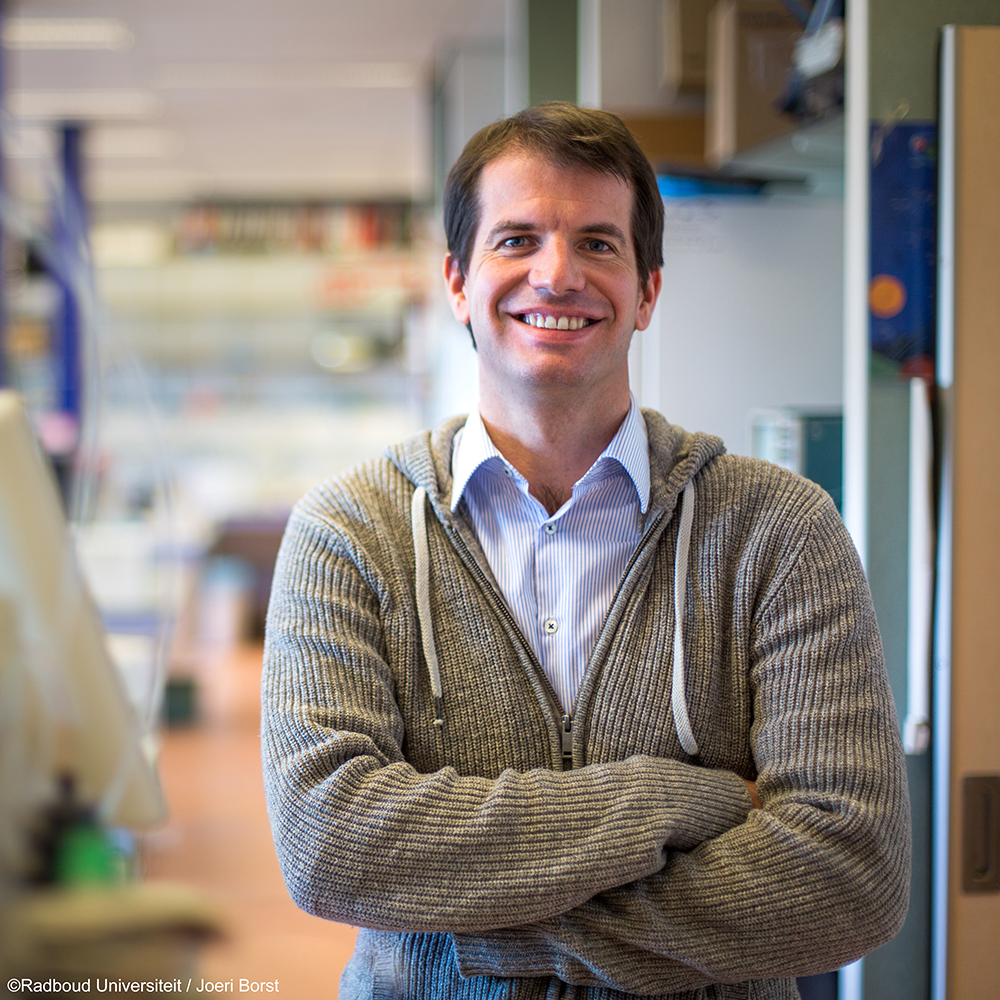Profile

Martijn Verdoes is a group leader in the Chemical Immunology team. Research interests include organic chemistry, chemical biology and tumor immunology with the aim to combine all these disciplines in the new and emerging field of chemical immunology. Current research projects focus on the development of novel immunomodulatory approaches to aid cancer immunotherapy. Molecularly defined macromolecules are synthesized to deliver tumor antigens to dendritic cells to educate the immune system. Furthermore, molecules which are able to dampen the immunosuppression in the tumor microenvironment are designed and synthesized to prime a tumor for infiltrating effector immune cells. To study the role of proteases in cancer, in specific immune cells and in specific cellular compartments, smart imaging tools – activity-based probes – are designed and synthesized and applied in noninvasive optical imaging, intravital microscopy and biochemical characterization studies. Together, the research efforts at the interface of chemistry and immunology will give us new insights in the development of more effective and safer immunotherapeutic approaches.
Short CV
Martijn Verdoes obtained his PhD in Organic Chemistry from Leiden University under the supervision of Prof. H. S. Overkleeft and Prof. G. A. van der Marel in 2008. His thesis work mainly focused on the design and synthesis of activity-based inhibitors and probes to study proteasome function. In 2009, Martijn obtained an NWO Rubicon fellowship to join the lab of prof. M. Bogyo at the Stanford School of Medicine, where he developed quenched activity-based probes (qABPs) for non-invasive imaging of cancer. Inspired by the observation that his qABPs got activated by specific immune cells in tumors he joined the Department of Tumor Immunology at the Radboud Institute for Molecular Life Sciences (RIMLS), Radboudumc in 2013. Since 2016, he is leading a multidisciplinary research group using chemistry to study and manipulate the immune system in cancer. He was awarded an Institute for Chemical Immunology (ICI) Tenure Track Fellowship, as well as an ERC Starting Grant “CHEMCHECK” and in 2019 he secured a tenured assistant professor position. His lab aims to develop strategies for chemistry-based precision immunotherapy using nanomaterials, small molecules and antibody targeted approaches to i) induce a tumor-specific immune response and ii) prime the tumor (microenvironment) for tumor-specific effector immune cells.
Key words
Chemical Immunology, Chemical Biology, Tumor Immunology, Cancer Immunotherapy, Cancer Vaccines, Tumor Microenvironment, Activity-based Probes, Proteases.
Key publications
For all publications click here.
- Functional diversification of hybridoma produced antibodies by CRISPR/HDR genomic engineering. Van der Schoot JMS, Fennemann FL, Valente M, Dolen Y, Hagemans IM, Becker AMD, Le Gall CM, Van Dalen D, Cevirgel A, Van Bruggen JAC, Engelfriet M, Fransen MF, Caval T, Bentlage AEH, Nederend M, Leusen JHW, Heck AJR, Vidarsson G, Figdor CG, Verdoes M*, Scheeren FA*. Sci Adv. 2019 Aug 28, Vol. 5, no. 8, eaaw1822.
- Attacking Tumors From All Sides: Personalized Multiplex Vaccines to Tackle Intratumor Heterogeneity. Fennemann FL, de Vries IJM, Figdor CG, Verdoes M*. Front Immunol. 2019, 10:824.
- Endolysosomal-Escape Nanovaccines through Adjuvant-Induced Tumor Antigen Assembly for Enhanced Effector CD8+ T Cell Activation. Qiu L, Valente M, Dolen Y, Jäger E, Beest MT, Zheng L, Figdor CG*, Verdoes M*. Small. 2018, 14, e1703539.
- Toll-like Receptor Agonist Conjugation: A Chemical Perspective. Ignacio BJ, Albin TJ, Esser-Kahn AP, Verdoes M*. Bioconjug Chem. 2018, 29, 587-603.
- Design of a highly selective quenched activity-based probe and its application in dual color imaging studies of cathepsin S activity localization. Oresic Bender K, Ofori L, Van der Linden W. A, Mock E. D., Data G, Chowdhury S, Li H., Segal E, Sanchez Lopez M., Ellman J. A., Figdor C. G, Bogyo M*, Verdoes M*. J Am Chem Soc. 2015, 137, 4771-7.